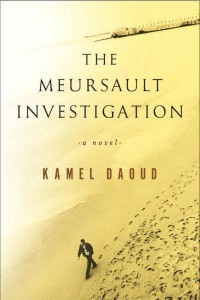June 9, 2015
New POVs: on Fifty Shades of Grey and The Mersault Investigation
by Andrew Karpan
 As everyone knows by now, the Penguin Random House empire has been graciously blessed with the newest installment in the Fifty Shades– related stack of money. Not coming to awkward up airplane bookstores until later in June, the latest from EL James’ dream factory is already in its first printing (1.25 million!) and already given a möbius strip of a title: Grey: Fifty Shades of Grey as Told by Christian. The cover, which resembles, maybe, tersely erotic I Origins-based fanfiction, will rehash the last three novels of James’ ripping tale but this time from Christian Grey’s gray intense-looking eyelids. These fresh 576 pages are humbly dedicated to us folk, presumably working in the publishing industry: “those readers who asked … and asked … and asked … and asked for this.”
As everyone knows by now, the Penguin Random House empire has been graciously blessed with the newest installment in the Fifty Shades– related stack of money. Not coming to awkward up airplane bookstores until later in June, the latest from EL James’ dream factory is already in its first printing (1.25 million!) and already given a möbius strip of a title: Grey: Fifty Shades of Grey as Told by Christian. The cover, which resembles, maybe, tersely erotic I Origins-based fanfiction, will rehash the last three novels of James’ ripping tale but this time from Christian Grey’s gray intense-looking eyelids. These fresh 576 pages are humbly dedicated to us folk, presumably working in the publishing industry: “those readers who asked … and asked … and asked … and asked for this.”
Somewhat less high profile this week is the English translation of Kamel Daoud’s The Meursault Investigation, which came out in the United States for the first time – winner of a number of high profile prizes in France last year, the Algerian novelist’s debut rehashes the narrative of Albert Camus’ classic The Stranger. Like James’ upcoming release, Daoud’s new novel tackles known fictional territory: taking on the Camus’ story from the eyes of Meursault’s unnamed murder victim, giving him the name Musa, and his long grieving brother. In an interview Daoud gave with The New Yorker, he claimed that though he may not claim the same fanatical control of the narrative he’s working working with, he felt that Camus’ concerns were very much his own:
The Stranger is Camus’s character, but also a symbol of the philosophical and human condition. It was valid in 1942 […] and it’s still valid today. I wanted to take another look at that strangeness. I’m not responding to Camus—I’m finding my own path through Camus.
Reinterpreting The Stranger is certainly nothing new and Daoud particular contextual rehashing of a regularly taught Western classic recalls Jean Rhys’ 1966 novel, Wide Sargasso Sea and Chinua Achebe’s Things Fall Apart—both postcolonial reinterpretations of/responses to Charlotte Brontë’s Jane Eyre and Joseph Conrad’s Heart of Darkness respectively. Recalling the latter, in an except of Daoud’s novel published in The New Yorker, Camus’ existential antihero is described as: “the big fat Frenchman, the obese thief of sweat and land.”
However, for many Algerians, the harsh political stand Camus took against Algerian independence has made his name synonymous with the colonial regime that thousands of Algerians died fighting to overthrow; in an interview with Middle East Eye, Daoud says he aims to partially change that: “I consider that we have the choice […] throw into the sea his [Camus’] 64 books or do the contrary. I made my decision.”
While this stance has allowed The Meursault Investigation to receive much acclaim in France, where Camus is still revered, Daoud has been the subject of death threats in his native Algeria. Late last year, a now-blocked facebook page suddenly emerged demanding Daoud’s public execution. Soon after, Abdelfatah Hamadache, an Algerian imam who leads the radical Islamic Awakening Front, attacked Daoud as an “enemy of religion” and called upon the Algerian government to take action against the novelist. In kind, while the Algerian government publicly condemned the death threats, the Algerian minister of religious affairs also used the opportunity to attacked Daoud and his work as “exploited by an international Zionist lobby hostile to Islam and Algeria.”
A similar appeal surrounds both The Meursault Investigation and Grey: that something new can be slithered into a narrative millions of readers already thought they knew backwards and forwards. Giving the infamously unnamed Arab of The Stranger a literal name forces readers to confront the existential portent of the novel proper; part of the reasons being suggested for the novel’s negative reaction in Algeria is the power of Camus’ negative image in the national legend; in the same interview with MEE, Daoud makes this clear: “A jihadist in the desert kills the same way as Meursault did.” In Fifty Shades of Grey as Told by Christian, EL James also wants to turn attention away from the endless listings of abusive behavior that have been picked dry from her bestselling novels. Jacket copy is promising that James will tell, instead, of “the horrors of his childhood that haunt Christian every night,” and will make a go at casting a hero out of Grey’s gray, gray eyes. Team Ana anyone?